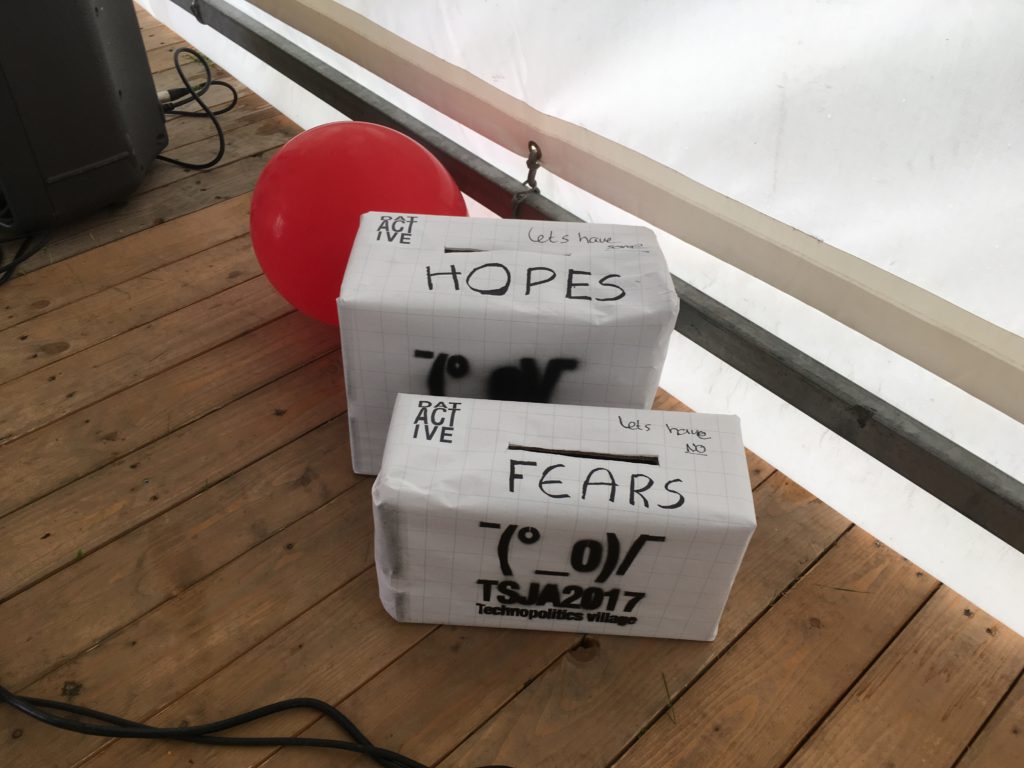Authors: Davide & Jeroen
A few weeks ago, a contingent of the DATACTIVE team attended SHA (Still Hacking Anyway), the periodic worldwide hacker camp hosted in the Netherlands. The great variety of people hanging around included IT pen-testers, system administrators, activists, developers, advocacy groups, journalists -and, of course, hackers. Around 3.300 attendants, 100 gigabit (!) of bandwidth, 320 talks, mixed with lights, music, artifacts of all kind -and a fair amount of drinks- contributed to characterize the gathering as a concrete embodiment of the hackers’ ethos of ‘work&play’.
We had the chance to attend dozens of talks and debates; to participate in the activity of the Technopolitics village TSJA; to interview dozens of participants; to give our own talk on mailing list analysis; to engage in chats, activities, and drinks with plenty of people.
Eager to trigger discussion, we asked ourselves: with this great group of people, why not conduct a small informal survey in the evening hours, exploiting the generally relaxed atmosphere characterizing this moment of the day?
Assisted by a bottle of vodka (to lure into the discussion the more reluctant ;-), we walked around in order to harvest peoples’ “hopes and fears” related to the inexorable process of datafication. After Jonathan Gray, we understand datafication as “[a way] of seeing and engaging with the world by means of digital data” (2016). Its political relevance descends by the fact that “data can also actively participate in the shaping of the world around us” (ibid.). Activists, advocates, techies, hackers and interested citizens are more and more concerned both with the threats and the opportunities that the transformation of every aspect of reality into data brings along. What do people fear the most? What is (if any) their biggest hope?
It is interesting to notice that quite often people would at first have a puzzled reaction: ‘What do you exactly mean?’ and ‘isn’t there a neutral-answer option?’ were frequent instinctive responses. However, while not yet completely fleshed out for the purpose of a poll, the question worked well as a trigger for small discussion and, in many cases, people would then start to recognize quite some fears and hopes they bring, engaging in animated conversations with us.
The fears of SHA participants seem to circulate very much around the general topic of control, and that of prediction mechanisms in relation to algorithms. Pessimistic answers include the recognition that “[those] who control communication (infrastructure) control society”, denote a strict concern for “[people] predicting the wrong answer (or the wrong things)” and the fear “to be categorized” and a to experience a “lack of control over data collection”. The hopes, instead, largely insisted on how blockchain technologies, open data, and hacking might contribute to a more decentralized (and thus controllable-from-below) world.
It must be said that (quite unexpectedly), the hopes outnumbered the fears. To be fair, whereas blunt optimism doesn’t seem to find roots in this community, we have to register some hopeless reactions, as the one whose only hope is that we run out of metal on our planet (and whose fear is that the mining industry might outsource to Mars…).
Overall, the theme of (lack of) control over peoples’ own lives seems to be the red thread. Data (as Kranzberg’s law on technology reminds us) are not good nor bad in themselves -but neither neutral, since who, when, how, and for what purposes gain control over them determines their oppressive or liberating potential. In other words, ‘big data’ are political issues, and people at SHA are much aware of that.
To conclude, two methodological notes. The term ‘datafication’, despite sometimes obscure to the respondents and overly-general for the quite structured question, worked well as a floating signifier to trigger people into discussion about the topic. The vodka, instead, would have worked better with some orange juice next to it -lesson learned.
If you wanna look it up yourself, here is a transcript of both fears and hopes:
Fears on datafication:
- who controls the communication (infrastructure) controls society
- centralization will limit knowledge and sharing until control over the population is complete
lack of control over data collection - fascism
- even if algorithms are neutral, the data they work with are biased
- to be categorized → filter bubble
- predict the wrong answer (or the wrong things)
- self-fulfilling prophecy as a service
- advancement of face recognition techniques
- people do not question algorithms
- they start mining metals on Mars
- genocide
Hopes on datafication:
- we run out of metal atoms to share all the data
- 42
- blockchain as a technology of socialism
- societies move in waves like everything in life. Future will require revolution
- the democratization of mapping data
- balancing power through open data
- people learn to question algorithms like they do with politicians
- new generations will be more aware and hack more
- It will prove mankind is hopeless
- helps with daily life
- that the data is used to solve problems of society
- it’s just a hype
- they (doing it) notice they are themselves getting fucked by categorization and negative impact on their lives
- decentralization through blockchain tech will give us the freedom to reclaim control over communication infrastructures
References
Gray, Jonathan (2016), “Datafication anddemocracy: Recalibrating digital information systems to address broader societal interests”, Juncture, Volume 23, ISSUE 3
